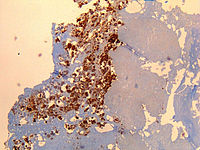
Photo from wikipedia
Infection with Coxiella burnetii, the causative agent of Q fever, can result in life-threatening persistent infection. Reactogenicity hinders worldwide implementation of the only licensed human Q fever vaccine. We previously… Click to show full abstract
Infection with Coxiella burnetii, the causative agent of Q fever, can result in life-threatening persistent infection. Reactogenicity hinders worldwide implementation of the only licensed human Q fever vaccine. We previously demonstrated long-lived immunoreactivity in individuals with past symptomatic and asymptomatic Coxiella infection (convalescents) to promiscuous HLA class II C. burnetii epitopes, providing the basis for a novel T-cell targeted subunit vaccine. ABSTRACT Infection with Coxiella burnetii, the causative agent of Q fever, can result in life-threatening persistent infection. Reactogenicity hinders worldwide implementation of the only licensed human Q fever vaccine. We previously demonstrated long-lived immunoreactivity in individuals with past symptomatic and asymptomatic Coxiella infection (convalescents) to promiscuous HLA class II C. burnetii epitopes, providing the basis for a novel T-cell targeted subunit vaccine. In this study, we investigated in a cohort of 22 individuals treated for persistent infection (chronic Q fever) whether they recognize the same set of epitopes or distinct epitopes that could be candidates for a therapeutic vaccine or aid in the diagnosis of persistent infection. In cultured enzyme-linked immunosorbent spot (ELISpot) assays, individuals with chronic Q fever showed strong class II epitope-specific responses that were largely overlapping with the peptide repertoire identified previously for convalescents. Five additional peptides were recognized more frequently by chronic subjects, but there was no combination of epitopes uniquely recognized by or nonreactive in subjects with chronic Q fever. Consistent with more recent/prolonged exposure, we found, however, stronger ex vivo responses by direct ELISpot to both whole-cell C. burnetii and individual peptides in chronic patients than in convalescents. In conclusion, we have validated and expanded a previously published set of candidate epitopes for a novel T-cell targeted subunit Q fever vaccine in treated patients with chronic Q fever and demonstrated that they successfully mounted a T-cell response comparable to that of convalescents. Finally, we demonstrated that individuals treated for chronic Q fever mount a broader ex vivo response to class II epitopes than convalescents, which could be explored for diagnostic purposes.
Journal Title: Infection and Immunity
Year Published: 2019
Link to full text (if available)
Share on Social Media: Sign Up to like & get
recommendations!